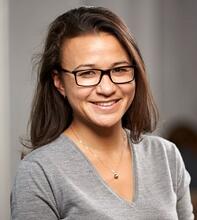BEHAVIORAL SCIENCES WORKSHOP
Abstract: How should the design of incentives vary with agent time preference? We develop two predictions. First, “bundling” the payment function over time - specifically by making the payment for future effort increase in current effort - is more effective if individuals are impatient over effort. Second, increasing the frequency of payment is more effective if individuals are impatient over payment. We test the efficacy of time-bundling and payment frequency, and their interactions with impatience, using a randomized evaluation of an incentive program for exercise among diabetics in India. Consistent with our theoretical predictions, bundling payments over time meaningfully increases effort among the impatient relative to the patient. In contrast, increasing payment frequency has limited efficacy, suggesting limited impatience over payments. On average, incentives increase daily steps by 1,266 (13 minutes of brisk walking) and improve health.
Rebecca Dizon-Ross is a development economist with an interest in human capital. Much of her current work is on the demand-side, aiming to understand the determinants of households’ investments in health and education. Before joining Booth, Dizon-Ross was a Prize Fellow in Economics, History, and Politics at Harvard University and a Postdoctoral Fellow in the Abdul Latif Jameel Poverty Action Lab at the Massachusetts Institute of Technology. She received a Ph.D. in Economics from Stanford University and a B.A. (summa cum laude) from Harvard University. Prior to graduate school, she worked as an analyst at McKinsey & Co.
This virtual workshop is open to the Yale community only. To receive Zoom information, you must subscribe to the Behavioral Science Workshop at the registration link using your Yale NetID.
Cosponsored by the Center for the Study of American Politics (CSAP) and the School of Management’s International Center for Finance and Whitebox Advisors fund.
